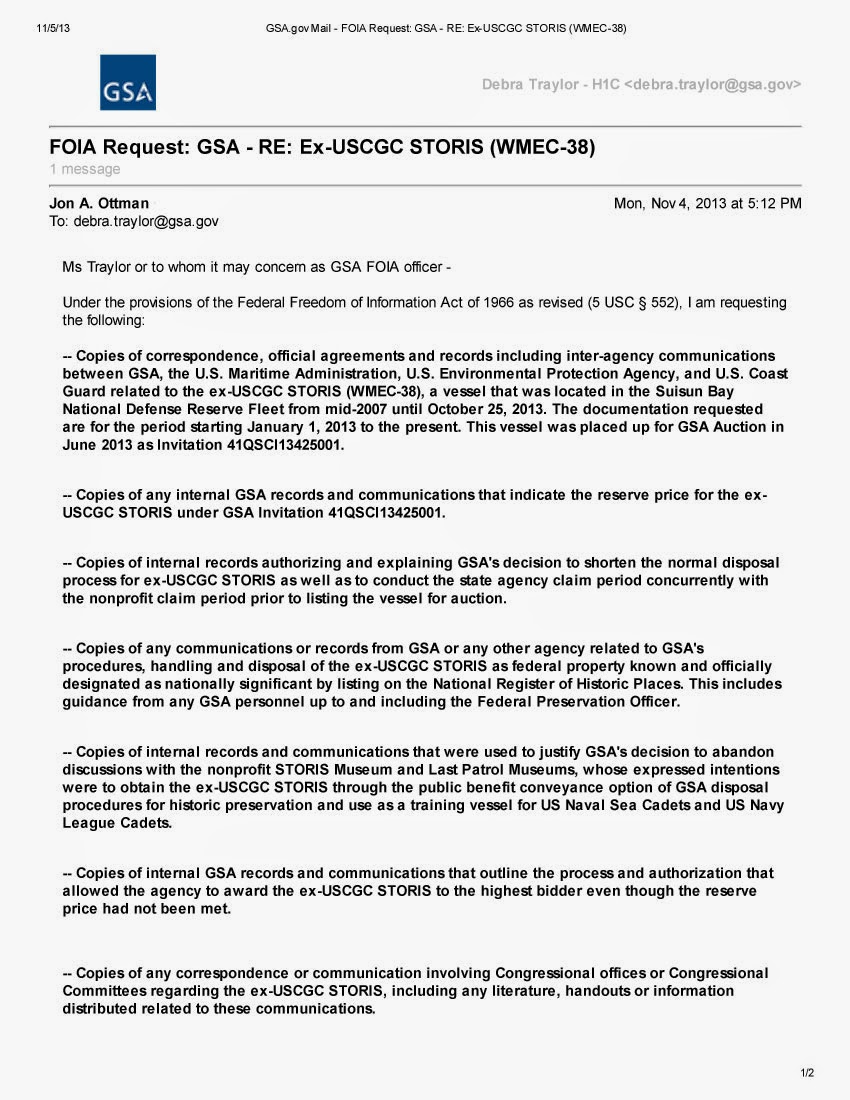First up will be the U.S. General Services Administration and their associated GSA Auction site.
www.gsa.gov
Administrator
Dan M. Tangherlini
“As administrator of the U.S. General Services Administration, Dan M. Tangherlini serves a vital role in President Obama’s agenda to build a more sustainable, responsible and effective government for the American people. GSA is responsible for improving the government’s workplace by managing assets, delivering maximum value in acquisitions, preserving historic property and implementing technology solutions.”
Please note the reference to “preserving historic property.”
As far as the “delivering maximum value,” selling STORIS for $70,100 (almost $30,000) less than the “secret” reserve price, to a so-called metal recycling company with no metal recycling facilities can hardly be called getting good value for the American taxpayer. Considering the historic value of the ship and the potential as an economic engine for historic and cultural tourism and education, STORIS was worth substantially more than that as an intact, preserved resource.
Here are some other GSA-related Web sites that outline how hard GSA officials and representatives work to be responsible and upstanding stewards of our country’s history (sarcasm intended).
http://www.gsa.gov/graphics/pbs/pbs_preservation.pdf
http://www.gsa.gov/graphics/pbs/Stewardship2008.pdf
http://www.gsa.gov/portal/content/104441
Here is the link for GSA’s Procedures for Historic Properties - ADM 1020.2 :
http://www.gsa.gov/portal/content/101031
It’s 91 or 117 pages long, depending on how you print it and full of technical, legal and preservation-related language. Boil it down though, and it makes it clear that GSA has a mandated responsibility to protect the historic resources of the U.S. that are placed in its care, particularly those that are eligible for or are listed on the National Register of Historic Places.
Under the purpose for the Historic Preservation Guidelines established for GSA operations related to historic properties, this is one of several particularly relevant sections:
“e. Because of the importance of these properties in America's history and culture, GSA has the further obligation to manage, maintain, use, repair, and improve these properties in a manner that will preserve their character-defining features and other qualities that make them eligible for listing in the National Register. This Order directs that each property under GSA's jurisdiction or control be evaluated for its historical and cultural significance, and that GSA consider the significant qualities of each property in planning and conducting its activities. This Order also provides guidance for carrying out GSA actions potentially affecting non-Federal historic properties in a manner that, to the greatest extent possible, preserves their significant features and qualities. The Order further describes the statutory basis for GSA’s agency-wide stewardship vision and outlines a framework for accomplishing these stewardship goals within a cost-conscious, customer-focused business environment.”
===
Once the legislative donation process that had been counted on for securing title to STORIS failed because of petty partisan politics in Congress, the U.S. Coast Guard excessed the ship to GSA for disposal. This, despite serious inadequacies in the hazardous materials documentation related to STORIS that would allow her to be excessed and sold under U.S. federal law. We have discussed this earlier and will address this more in future posts.
The U.S. General Services Agency is the government agency directly responsible for ending government discussions with the STORIS Museum and The Last Patrol for the preservation of CGC STORIS. The break in negotiations went directly through Heather Bischoff, Regional Performance Management Officer in the Atlanta office of GSA and Tonya Dillard, a “property disposal specialist” in the same regional office.
While GSA promotes itself as a responsible steward of historic properties, rather than promote the historic preservation of one of the most historic cutters ever to serve the U.S. Coast Guard, GSA instead put STORIS up for auction and sold the ship at less than the secret reserve price to U.S. Metals Recovery, LLC. of San Diego.
GSA failed STORIS completely and in so many ways, leaving many questions as to how and why this happened.
Now after the fact, GSA is following the typical playbook for a government agency who doesn’t want to fulfill a Freedom of Information Act: play ignorant, stay silent only to say that proper procedures were followed, that the information requested will not reveal any new information and, most importantly, threaten the requestor with excessive fees in the hopes that the threat of a large bill will force the abandonment of FOIA request.
The next series of posts outline the correspondence with GSA starting with the Freedom of Information Act request submitted to GSA on November 4. The documents speak for themselves. In some places, particularly relevant language has been highlighted in red.
The original FOIA Request:
The Response from GSA
My appeal to GSA. It speaks for itself:
The final denial of the fee waiver from GSA. Again, note the GSA's assertion that the requested materials will not reveal any new information about the excessing and disposal of STORIS. This is patently false, as all of the discussion and correspondence related to the ship took place outside of the public purview, for all intents and purposes IN SECRET. The position that posting information to a Web site is a passive form of sharing information is also baseless, as the efforts to interpret the sequence of events here, on Facebook and on the new STORIS Web site are demonstrating:

Before the OGIS decision is made, since GSA issued its final decision on the fee waiver on Jan. 7, an email from Heather Bischoff in Atlanta came in on Jan. 28, looking for direction as to whether the FOIA request would be withdrawn following the final denial or whether GSA should proceed with a fee determination. One can imagine that GSA would prefer the former, but instead the response speaks for itself.











No comments:
Post a Comment